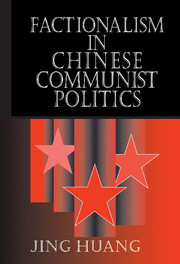Book contents
- Frontmatter
- Contents
- List of Figures and Tables
- Preface
- List of Abbreviations
- Introduction
- 1 Factionalism, the Puzzle of Chinese Communist Politics
- 2 Factionalism and the Political System in China
- 3 The Establishment of the Yan'an Round Table
- 4 The Transition of the Yan'an Round Table
- 5 Crises in Leadership Relations with the Two-Front Arrangement
- 6 The Collapse of the Yan'an Round Table and the Unleashing of Factionalism
- 7 Deng Xiaoping's Dominance: Factionalism Prevails over the Party Spirit
- 8 Conclusion
- Selected Bibliography
- Index
6 - The Collapse of the Yan'an Round Table and the Unleashing of Factionalism
Published online by Cambridge University Press: 11 September 2009
- Frontmatter
- Contents
- List of Figures and Tables
- Preface
- List of Abbreviations
- Introduction
- 1 Factionalism, the Puzzle of Chinese Communist Politics
- 2 Factionalism and the Political System in China
- 3 The Establishment of the Yan'an Round Table
- 4 The Transition of the Yan'an Round Table
- 5 Crises in Leadership Relations with the Two-Front Arrangement
- 6 The Collapse of the Yan'an Round Table and the Unleashing of Factionalism
- 7 Deng Xiaoping's Dominance: Factionalism Prevails over the Party Spirit
- 8 Conclusion
- Selected Bibliography
- Index
Summary
How could Mao do away with the Party state? Why did Mao initiate his assault in the cultural field? Most Western analysis and the CCP official accounts blame Mao's absolute power and his personality cult, and see as random its initial unfolding in the cultural field. Yet my examination in Chapter 5 shows that Mao's authority was at its lowest ebb in 1965. By then, the Party bureaucrats (PB) had controlled the policy process, and the remarkable recovery from the GLF under their management had increased their reputation and influence. Their control was so extensive that Mao was virtually incapable of doing anything in Beijing without their cooperation.
Mao had to find the legitimacy – that is, an ideological justification – and a force to break the Party state. He obtained the legitimacy by provoking a confrontation with the PB in the cultural field, which is why the Cultural Revolution preluded an all-out assault on the Party establishment; and he organized his forces outside the Party state, which is why his personality cult was created in order to impel and control a broad but poorly organized mass movement. Thus, Mao's personality cult and his absolute power were not so much the cause as the result of the CR.
- Type
- Chapter
- Information
- Factionalism in Chinese Communist Politics , pp. 267 - 349Publisher: Cambridge University PressPrint publication year: 2000

